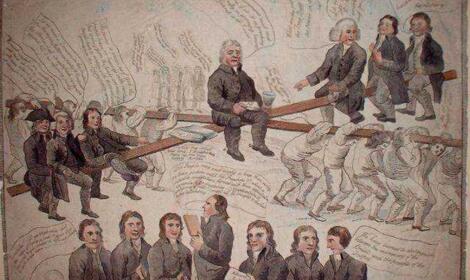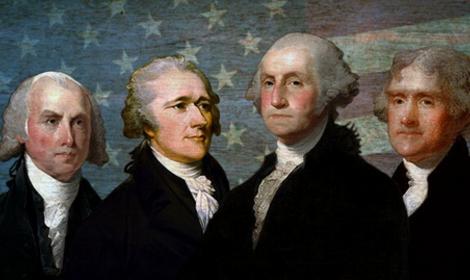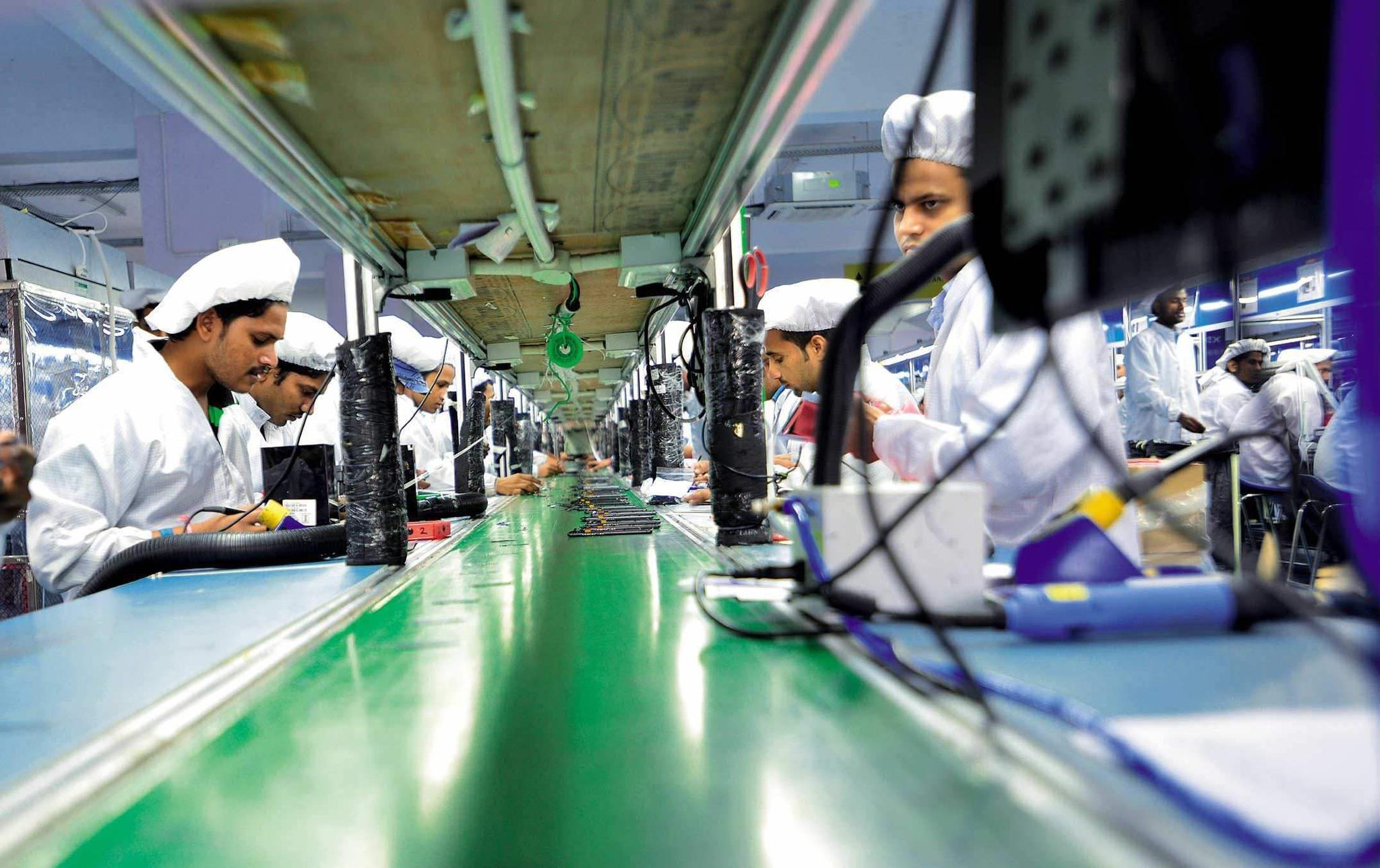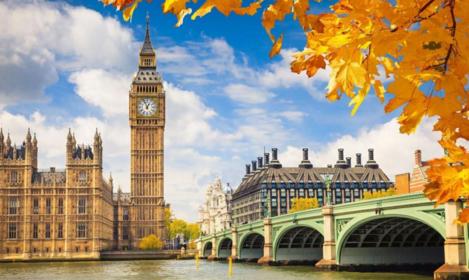QA:印度人怎么看待英国统治时期?
正文翻译
Was British rule in India benevolent?
英国在印度的统治是仁慈的吗?

英国在印度的统治是仁慈的吗?

评论翻译
Balaji Viswanathan
I wish I were commander-in-chief in India ... I should proclaim to them that I considered my holding that appointment by the leave of God, to mean that I should do my utmost to exterminate the race
-- Charles Dickens (1857)
If death were benevolent, then Brits were benevolent in India.
Criminal Negligence: When the British took India, it had the second highest GDP in the world and was termed as the "crown jewel of the empire". It was the land to which Christopher Columbus and Vasco da Gama risked their lives to find a route. By the time they left, this is what India looked like. Under the company, India was denied the adoption of a lot of key technologies, although historically Indians were quick to adopt best of overseas technologies. Since independence, some improvement has been made to wipe out famines and improve life expectancy.
Famines ravaged India. One of them in 1876-78 killed 10 million people from where I come from: http://en.wikipedia.org/wiki/Great_Famine_of_1876%E2%80%931878
(Until the 18th century we had only 18 recorded famines. However, just in 25 years since 1875 we had that many and far more brutal).
Brutal reprisals: Plenty of new research has uncovered systematic brutality, especially following India's first rebellion in 1857. Between 1-10 million Indians disappeared. All the fighting Indian soldiers were slaughtered. India's secret history: 'A holocaust, one where millions disappeared...'
Economic plunder. When Brits arrived (in 1700s) India accounted for 25% of world GDP. By the time they left in 1947, India's share was reduced to about 2%. [Zoom to get a better view]. Since the British left, we are now back to growing ways (see the yellow worm, slowly clawing back).
Wars: Britain pulled India's men into wars that had nothing to do with India. Over 1.3 million men served in the World War I and over 2 million served in World War II (with over 87000 men died in it). But, that was not the worst part. Britain took us into war with China (with whom we had a completely peaceful relationship for 5000 years). The Opium wars (see: http://en.wikipedia.org/wiki/Opium_Wars) is not only responsible for the current state of world drug trade, but also is the reason for the current disputed border between India & China. British India also fought with Afganistan and other countries with whom we were in historic good terms.
In a nation that invented the decimal system and is renowned historically for mathematics, science and arts, British institutional apathy and bad policies reduced the literacy rate to 12% at the time of independence in 1947. Since then, the rate multiplied five-fold (see the acceleration after 1951). Look at the first 5 decades and the last 5 of 20th century as a proof of British "benevolence" at work.
Jallianwalabagh Massacre. Hundreds of Indians, peacefully marching were surrounded and fired by a British general. This is one of the saddest days in modern Indian history. http://en.wikipedia.org/wiki/Jallianwala_Bagh_massacre This is just one of the many examples where British government was ruthless & brutal on Indian populace.
In 1950, life expectancy in India (31 years) was less than half that in the US (68 years). But by 2005, India (64 years) was not far behind the US (77 years).
Source: http://timesofindia.indiatimes.com/home/opinion/sa-aiyar/swaminomics/Our-greatest-achievement-longer-lives/articleshow/2291641.cms? India had extremely low life expectancy during the British rule. This screwed up our economy & society in so many ways.
When Brits left India, they intentionally made the accession ambivalent to divide the nation into 1000s of princely states. Luckily for India, Churchill was voted out of power and India had a great nation builder who rebuilt the nation out of 1000s of princely states each wanted to have its own nation. See: http://en.wikipedia.org/wiki/Political_integration_of_India
While Indian mainland had slightly better prisons, the Raj exported many freedom fighters to the brutal jail in Andaman Islands where they were put into inhuman torture. http://en.wikipedia.org/wiki/Cellular_Jail
At the end of the 18th century, Hindus and Muslims finally started to get back together in the last stages of Mughal era (See: http://en.wikipedia.org/wiki/Bahadur_Shah_II Zafar explicitly stated that both Hinduism and Islam shared the same essence.). However, the Brits came in and destroyed the fragile integration process. The British had the historic "Divide and Rule" policy that ultimately climaxed in India-Pakistan partition in 1947. The event killed millions and displaced dozens of millions of people.
Final note: Most of us have nothing against the present Britain or British people, for 5 reasons:
Most of the horrors happened when none of the present Brits were born. 3 generations have come since the time of Indian independence.
Most of the British public had nothing to do with the colonial Raj. Though they indirectly benefited, they had no direct hand. In fact, a good chunk of the British public were sympathetic to Gandhi's struggle.
A lot of what they did was not inconsistent with the morals that were held by the world then. Many of the things like slavery were legal then. We can judge people only against the morals of their era and not by the morals of the present era.
Things could have been worse, had India come fully under another colonial power such as the French, Spanish or later the Germans or Japanese. The British Empire was the least of the colonial evils.
And finally, a lot of us appreciate the finer aspects of British culture. Apart from Cricket, Tea, English language, Victorian era architecture we are thankful for the Indian railways, postal, army and banking systems and the common law structure.
“我希望我是印度的总司令......然后我会向他们宣布,既然我在上帝的许可下担任这一职务,这就意味着我应该尽最大努力来消灭这个种族。”
--查尔斯-狄更斯(1857年)
如果死亡是仁慈的,那么英国人在印度的统治就是仁慈的。
1. 对发展犯罪般的疏忽:当英国占领印度时,它的GDP位居世界第二,被称为“帝国皇冠上的明珠”。克里斯托弗·哥伦布和瓦斯科·达伽马冒着生命危险寻找前往印度的路线。而当他们离开时,下图就是印度的样子。在该公司的领导下,印度没有采用许多关键技术,尽管历史上印度人很快就会采用最好的海外技术。只有在自独立之后,才在消除饥荒和提高预期寿命方面取得了一些进展。
1.1 饥荒蹂躏了印度。其中仅在 1876-78 年间就杀死了 1000 万人,数据来源:

1.2 残酷的报复:大量新的研究揭示了系统性的暴行,特别是在1857年印度第一次叛乱之后。100万至1000万印度人失踪。所有起义的印度士兵都被屠杀了。印度的秘史:“一场大屠杀,数百万人失踪......”(链接)
1.3 经济掠夺:当英国人到达印度时(1700年代),印度占世界GDP的25%。到1947年他们离开时,印度的份额已降至约2%。自从英国人离开后,我们现在又回到增长模式(见黄色柱状,正慢慢地爬回去)。

2. 战争:英国将印度的人拉入与印度无关的战争。超过130万人在第一次世界大战中服役,超过200万人在第二次世界大战中服役(超过87000人死于第二次世界大战)。但是,这还不是最糟糕的部分。英国带领我们与中国开战(我们与中国保持了 5000 年完全和平的关系)。鸦片战争(见:http://en.wikipedia.org/wiki/Opium_Wars)不仅是造成世界毒品贸易现状的原因,也是目前印度和中国之间边界有争议的原因。英属印度还与阿富汗和其他国家作战,虽然历史上我们与他们保持着良好关系。
3. 在一个发明了十进制系统并以数学、科学和艺术而闻名的国家,英国制度的冷漠和糟糕的政策将1947年印度独立时的识字率降低到12%。从那时起,这一比率增加了五倍(参见1951年后的加速)。看看20世纪的前5个十年和后5个十年的对比,作为英国“仁慈”的证明。
4. 贾利安瓦拉巴格大屠杀。数百名和平游行的印度人被一名英国将军下令包围并开枪。这是现代印度历史上最悲伤的日子之一。 这只是英国政府对印度民众无情和残酷的众多例子之一。
http://en.wikipedia.org/wiki/Jallianwala_Bagh_massacre

5. 1950年,印度的预期寿命(31岁)不到美国的一半(68岁)。但到2005年,印度(64岁)并不落后于美国(77岁)。在英国统治期间,印度的预期寿命极低。这在很多方面搞砸了我们的经济和社会。
6. 当英国人离开印度时,他们故意把加入印度的事情弄得很暧昧,将国家划分为1000多个土邦。对印度来说,幸运的是,丘吉尔被赶下了台,印度有了一个伟大的国家建设者,在每个邦都想拥有自己的国家的时候,他在1000多个土邦中重建了国家。参阅: http://en.wikipedia.org/wiki/Political_integration_of_India
7. 虽然印度本土有稍微好一点的监狱,但英国人将许多自由战士运送到安达曼群岛的残酷监狱,在那里他们受到了非人的折磨。http://en.wikipedia.org/wiki/Cellular_Jail。
8. 18世纪末,在莫卧儿时代的最后阶段,印度教徒和穆斯林终于开始重归于好(见:http://en.wikipedia.org/wiki/Bahadur_Shah_II 扎法尔明确表示,印度教和伊斯兰教都有相同的本质)。然而,英国人的到来破坏了这个脆弱的融合过程。英国人制定了历史性的“分而治之”政策,最终在1947年的印度-巴基斯坦分治中达到高潮。这一事件导致数百万人死亡,数千万人流离失所。
最后说明:我们大多数人并不敌视现在的英国或英国人,原因有5个:
1. 大多数恐怖事件发生在现在的英国人都没有出生的时候。自印度独立以来,已经过了有3代人了。
2. 大多数英国公众与殖民地印度无关。虽然他们间接受益,但他们没有直接参与。事实上,有相当一部分英国公众对甘地的斗争表示同情。
3. 他们的所作所为与当时世界所持有的道德并不矛盾。许多像奴隶制这样的事情在当时都是合法的。我们只能根据他们时代的道德来判断人们,而不是根据当今时代的道德来判断。
4. 如果印度完全处于另一个殖民大国之下,如法国、西班牙或后来的德国人或日本人,情况可能会更糟。大英帝国是殖民帝国中罪恶最小的。
5. 最后,我们很多人都欣赏英国文化中精致的方面。除了板球,茶,英语,维多利亚时代的建筑,我们也感谢留下了印度铁路,邮政,军队和银行系统以及日常法律结构。
John Cate
This is a very fair and balanced view of things. For a long time, I had thought of the Raj as a good thing for India because it gave the country all of the good things about British culture and united India when it was disunited. But that’s only looking at India from a modern perspective. Independent India was able to keep the British infrastructure and legal system and get rid of the British economic exploitation and oppressive colonial government—and all we see today are the good parts of the British legacy.
But India could have pulled itself together on its own and become a great, united nation again, without having to suffer through centuries of foreign colonial rule. Turkey and China both did it, and I’m sure India could have too.
这是一种非常公平和平衡的观点。很长一段时间以来,我一直认为大英帝国的统治对印度来说是一件好事,因为它给了这个国家所有关于英国文化的好处,并在印度分裂时统一了印度。但这只是从现代的角度来看待印度。独立的印度能够保留英国的基础设施和法律体系,摆脱英国的经济剥削和压迫性的殖民政府——我们今天看到的只是英国遗产的美好部分。
但是,印度本来可以靠自己的力量团结起来,再次成为一个伟大的、统一的国家,而不必经历几个世纪的外国殖民统治的痛苦。土耳其和中国都做到了,我相信印度也可以做到。
Balaji Viswanathan
The biggest thing India lost was the ability to participate in the industrial revolution. India was a leading textile producer in the 1700s and the Industrial Revolution started 20 years after the colonization. India could have soundly transitioned and indeed some of the independent states in India did try to transition to industrialization [Bangalore is a part of one such independent state with Asia’s first electrification & other engineering innovations], but they were too few.
The viceroys of India were English who were doing temporary work in India and didn’t know/care about building domestic industrial capacity. Thus, India lost all its textile production to Britain.
印度失去的最重要的东西是参与工业革命的能力。印度在17世纪是一个领先的纺织品生产国,工业革命是在殖民化20年后开始的。印度本可以顺利过渡,事实上,印度的一些独立国家也曾试图向工业化过渡(班加罗尔就是这样的独立国家之一,拥有亚洲第一个电气化和其他工程创新),但他们太少了。
印度的总督是英国人,他们只当在印度的工作是做临时工,不知道/不关心建立印度国内工业的能力。因此,印度的纺织品生产全部输给了英国。
Jayakrishna Srinivas
India was deliberately kept out of industrialization. The lack of Indian industries benefited the English who exported the Indian resources to Britain, supplemented the revolution and used the huge Indian market to plunder the wealth. Systematically, the flourishing Indian industries were eliminated to create the English market monopoly.
印度被故意排除在工业化之外。印度工业的匮乏使英国人受益匪浅,他们把印度资源出口到英国,补充英国的工业革命,利用巨大的印度市场掠夺财富。系统地,繁荣的印度工业被淘汰,创造了英国市场的垄断。
Rohit Jamwal
After reading the comments I am not sure if the invasion helped us or them or whatever people glorifying the british rule are trying to say, but I wished they would have never invaded. I don't know what we would have lost by that or gained but at least we would have had an identity of our own, instead of blindly following whatever it is that west brings to the plate nowadays. May be in that scenario we would have treated our languages and culture with a little bit of more respect, instead of trying to copy the west. Not saying that there culture is bad, but it's better to be the first you than to be a second someone. Though I do applaud the removal of sati, dowry or any such systems by the British rule, if they actually did that(sorry not an history buff, neither interested in searching).
看完评论后,我不确定入侵是帮助了我们还是帮助了他们,或者不管那些美化英国统治的人想说什么,我都还是希望他们从未入侵过印度。我不知道我们会因此失去什么或得到什么,但至少我们会有自己的身份,而不是盲目地追随西方现在带来的东西。也许在这种情况下,我们会更加尊重我们的语言和文化,而不是试图复制西方。不是说人家的文化不好,但做自己总比模仿别人要好。虽然我很赞赏英国统治者对殉夫自焚、嫁妆或任何此类糟粕制度的消除,前提是他们真的做到了的话(对不起,我不是历史爱好者,也没有兴趣去搜索)。
Subhash Kasturi
Balaji, Liked your answer and reasoning. However I am a bit surprised that the most biggest legacy the British has left to its colonies .. Corruption has been forgotten. Starting their pursuits as traders, the early Britishers never bothered about ethics or governance. The profits of trade was far less to East India Company when compared to the profits earned by Individuals. Unfortunately, this approach continued even when Governance become the main 'trade'. Starting from Robert Clive, Warren Hastings, Lord DalHousie even to Lord Mountbatten all of them were involved in organized corruption and had Parliamentary proceedings against each of them. This has left a deep wound in country governance even till date. As one author said, In 1700 and 1800s Britain biggest export to the world is Corruption. :) .
巴拉吉,我很喜欢你的回答和推理。然而,我有点惊讶的是,英国人留给其殖民地的最大遗产--腐败却被遗忘了。早期的英国人以商人的身份开始他们的追求,从不关心道德或治理。与个人所得的利润相比,东印度公司的贸易利润要少得多。不幸的是,即使在治理成为主要的“贸易”时,这种做法仍在继续。从罗伯特·克莱夫、沃伦·黑斯廷斯、达尔豪斯勋爵到蒙巴顿勋爵,他们都参与了有组织的腐败,英国议会对他们每个人都进行了诉讼。直到今天,这都给印度的国家治理留下了深深的创伤。正如一位作者所说,在1700年和1800年代,英国对世界最大的出口是腐败。:)
Gaurav Verma
I think the last point of appreciation is a surely a disagreement. Though not sure of postal, army and banking system, railways certainly can’t be treated as their gift to India (as Brits often cherish). Referring to Shashi Tharoor’s (Indian politician) recent book on British Era, railways were used only for Britain’s personal profit and the developmental amounts were paid by Indians (in various forms of taxes) and still they were only allowed to travel in lower class coaches like animals. Many other points against the Brits’ so called “gift” to India.
我对赞赏部分里的最后一点表示不同意。虽然不确定邮政、军队和银行系统是不是,但铁路肯定不能被当作他们留给印度的礼物(就像英国人经常怀念的那样)。参考沙希-塔鲁尔(印度政治家)最近关于英国统治时代的书,英属印度时期铁路只用于英国的利益,印度人支付了发展的金额(各种形式的税收),但他们却只被允许像动物一样乘坐低等客车。书中还有许多其他观点反对英国人对印度的所谓“礼物”。
Martin Devasia
these 5 points glorify Britain too much, did you forget that Britain was the largest empire in world history therefore they had many other colonies which they would have done similar things like they done in india thats what sets Britain apart from the rest, sry balaji but i wont give an upvote since you put these 5 things glorifying the British, the sins they committed far outweigh the good things they done for india, so tell me has Britain apologised to us like they did with the other colonies?
这 5 点太美化英国了,你忘了英国是世界历史上最大的帝国,因此他们有许多其他殖民地,他们会做类似的事情,就像他们在印度所做的那样,这就是英国与众不同的地方,对不起巴拉吉。但这次我不会点赞,因为你用这 5 件事美化了英国, 他们犯下的罪孽远远超过他们为印度所做的好事,所以告诉我英国是否像对待其他殖民地那样向我们道过歉?
Sharan Kumar K
While my blood heated up reading the first few passages, it cooled reading the last passage.
在阅读前几段的时候我血压都要爆表了,阅读最后一段时冷却了下来。
Arun Kumar
Sir, you forgot to mention the “The Bengal Famine of 1943”. It was one of the worst genocide ever recorded in history.
先生,你忘了提到“1943年的孟加拉饥荒”。这是历史上最严重的种族灭绝之一。
Anna Kuriakose
One man's benevolence is another man's humiliation.
If:
a smart, savvy man knocked on your door,
made obeisance and requested a room to live in,
flattered you and gave you gifts, gained your trust and bribed your friends away,
then started giving you counsel on how to run your home; slowly started re-arranging your home,
eventually took over your best room, your best linen and best china, and your business and livelihood,
took your kids' toys away, and decided what they should and should not learn in school, decided what career they should choose,
and then one day, got hold of your bank cards and cheque books and started writing large cheques to himself,
spent your money to make his own place bigger, his business better and clothe/feed/educate his family better,
built an extension to your house to make his stay more comfortable - with your money,
bought new appliances and gadgets, with your money, all of which he kept primarily for his own use,
made you and your family work hard to feed his needs, made you dress to please him, talk in his accent to please him,
killed your first-born when he dared to protest at the this mistreatment,
smartly eliminated further opposition by getting your kids to fight among themselves,
played God with you in his moments of expansiveness by 'improving' you,
fed you and your family scraps from his table, and put your kids to fighting his battles elsewhere,
starved one of your kids to death by stashing your food away behind locked doors,
even re-wrote the story of your family so that you never can explain to someone what your life would have been if he hadn't interfered,
and, eventually boasted to the world about all the wonderful changes he has brought to your house…how he brought new technology to your home, and how he has taught you to talk/walk/behave more fittingly like him…
Then:
even if other people believed him, would you? and would you call him benevolent?
一个人的仁慈对另一个人来说就是羞辱。
如果:
● 一个聪明的、精明的人敲开了你的门
● 向你行礼,并要求你给他一个房间住
● 谄媚你,送你礼物,取得你的信任,贿赂你的朋友
● 然后开始给你提供关于如何管理你的家的建议;慢慢开始重新安排你的家
● 最终接管了你最好的房间、最好的床单和最好的瓷器,以及你的生意和生计
● 把你孩子的玩具拿走,决定他们在学校应该和不应该学什么,决定他们应该选择什么职业
● 然后有一天,掌握了你的银行卡和支票簿,开始给自己开大额支票
● 花费你的钱,使他自己的地方更大,他的生意更好,使他的家人得到更好的衣服/食物/教育
● 用你的钱给你的房子扩建,让他住得更舒服
● 用你的钱买了新的电器和小工具,这些都是他主要留给自己使用的
● 让你和你的家人努力工作以满足他的需求,让你的穿着打扮来取悦他,用他的口音说话来取悦他
● 当你的长子敢于抗议这种虐待时,他杀了他
● 巧妙地通过让你的孩子们互相争吵来消除进一步的反对
● 在他心情好的时候通过“改善”你的处境来扮演天神
● 给你和你的家人吃他桌子上的残羹剩饭,让你的孩子在其他地方为他战斗
● 把你的食物藏在上锁的门后,把你的一个孩子饿死
● 甚至改写了你的家庭故事,使你永远无法向别人解释,如果他不干涉,你的生活会是什么样子
● 并且,最终向全世界吹嘘他给你们家带来的所有奇妙变化......他如何给你们家带来新技术,以及他如何教你们说话/走路/行为更像他......
然后:
● 即使其他人相信他,你会吗? 你会说他是仁慈的吗?
Roshni Nair
Best answer ever. The Brits pretty much messed up our country. I don’t know what their people are reading in their history books about ‘civilizing’ us (when we already had a rich culture and civilization), their reign was no less than Hitler’s holocaust.
有史以来最好的答案。英国人几乎完全搞砸了我们的国家。我不知道他们的人民在历史书上读到的关于“文明化”我们(当时我们已经拥有丰富的文化和文明)的内容是什么,他们的统治不亚于希特勒的大屠杀。
Debarpan Musib
When the Britishers landed on a port in India, we Indians threw flowers on them. If instead of flowers we had thrown stones, India would've never gone under their rule.
当英国人登陆印度的一个港口时,我们印度人向他们投掷鲜花。如果我们扔的是石头而不是鲜花,印度永远不会受到他们的统治。
Linda Athale
And would be doing exactly what now?
现在的印度到底会怎么样?
Mayuresh Bhagwat
Doing a lot better, only the map would be slightly different than today!
会做得更好,只是地图会和今天略有不同!
Joseph Davies
By a lot better do you mean throwing widowed women onto fires, practicing slavery, being murdered by the thuggees for trying to run a business and not having any form of modern medicine such as vaccine technology?
你的意思是把寡妇扔进火里,实行奴隶制,因为试图经营企业而被暴徒谋杀,没有任何形式的现代医学,如疫苗技术,这叫要好得多?
Hemant Kumar
Even today we are suffering the consequences of that benevolence in the form of a divided subcontinent,disputed borders and terrorism.
This benevolence was also instrumental in subdueing our confidence in our own culture.
即使在今天,我们仍在遭受这种“仁慈”的后果,其形式是次大陆分裂、边界争议和恐怖主义。
这种仁慈也造成了我们对自己的文化缺乏信心。
Ravi Aguva
I don't like British. However, only good thing about their rule was to bring a large subcontinent of various languages,religions and castes under a single Political umbrella, paving the way for Independent India , as we see it today. The British motive was however self serving.
我不喜欢英国人。然而,他们的统治唯一的好处是将各种语言,宗教和种姓的整个次大陆置于一个单一的政治保护伞下,为我们今天看到的独立印度铺平了道路。当然了,英国的动机是自私的。
Kaushik Slv
I want to drink british blood now!
我现在想喝英国人的血!
Vishal Kale
You took the words out of my mouth...
Well said! Quite Appropriate!
你简直就是我的嘴替啊...
说得好!相当恰当!
Shariq Saleem
The very worst chapter in our history that smashed to smithereens all we created from Indus Valley Civilisation to the Great Mughals.Had the masses in rest of India joined the common peasantry in Awadh during 1857's first war of independence, we would certainly had thrown the 100,000 Brits who strangulated our grand nation from north to south into the Arabian Sea, saving the heart and core of our country..or the Aryavarta, which unfortunately now lay truncated into Nepal,India,Bangladesh,Pakistan and Afghanistan.
这是我们历史上最糟糕的一章,它将我们从印度河谷文明到大莫卧儿王朝所创造的一切砸得粉碎。如果印度其他地区的群众在1857年第一次独立战争期间加入阿瓦德农民的斗争,我们肯定会把从北到南扼杀我们伟大国家的10万英国人扔进阿拉伯海,拯救我们国家的心脏和核心......或雅利安·伐尔塔,不幸的是,它现在被截断为尼泊尔、印度、孟加拉国、巴基斯坦和阿富汗。
(译注:雅利安·伐尔塔,含义为高贵者的领土,或雅利安人的神圣国土,在古梵语中是指北印度。是由喜马拉雅山的犍陀罗至温迪亚山脉,孟加拉湾至阿拉伯海)
Piyush Abhishek Singh
we lost because our own betrayed us. It was 5 kingdoms vs rest of India with few Brits.
我们输了,因为我们自己背叛了我们。那是5个王国对印度其他地区和少数英国人的战争。
Shariq Saleem
You are right Piyush, but the larger problem lay within about why the great war of independence failed to enthusiase the man on the street in other parts of India barring Awadh.For e.g. East India Company was the first to employ lower castes as professional soldiers.Many common people elsewhere in India did not see clear alternative to the British other than the same old Brahmanical system that had enveloped them over centuries,irrespective of who the ruler was.
你是对的,但更大的问题在于,为什么伟大的独立战争没能让除阿瓦德以外的印度其他地区的人热心起来,例如,东印度公司是第一个雇用低种姓作为职业军人的公司。印度其他地方的许多普通人除了几个世纪以来笼罩着他们的古老的婆罗门教体系外,没有看到有英国人之外的明确选择,无论统治者是谁。
Vijayraj Kamat
I would also take responsibility for being a fool pretending to be a 'nice guy' while my guest duped me for so long
我认为这个假装自己是个好人却被门客愚弄甚至反客为主的傻瓜也有责任
Farhad Tarapore
You've portrayed only the negative aspects. What about the positive ones? The ghats and roads that they built are still better than the horrible potholed crap that we drive on these days. Trains still run on the tracks that they laid.
We spit and shit on the roads and treat our country like a dustbin. Indians needed a dictator then, and they desperately need one now. Only caveat is to get one who has the good of the country at heart and doesn't let the power corrupt him or her absolutely. Easier said than done, I guess.
你只描绘了消极的一面。积极的呢?他们修建的高架桥和道路仍然比我们现在行驶的可怕的坑洼不平的垃圾要好。火车仍然在他们铺设的轨道上运行。
我们在道路上吐痰和拉屎,把我们的国家当作一个垃圾桶。印度人当时需要一个独裁者,他们现在也迫切需要一个。唯一需要注意的是,要找一个心里装着国家利益的人,不要让权力绝对腐蚀他或她。我想,说起来容易,做起来难。
Sameer Desai
You do know that they only did it so they could loot us more efficiently don't you?
Indians needed a dictator? Really? You don't think the kingdoms/empires that came before them never thought of modernisation? You think without british infrastructure could never have been made? You need to reread history.
你知道他们这样做只是为了更有效地掠夺我们,不是吗?印度人需要一个独裁者?认真的?你不知道之前的那些王国/帝国已经想过要现代化了吗?你认为没有英国基础设施就不可能建成?你需要重新读读历史。
I wish I were commander-in-chief in India ... I should proclaim to them that I considered my holding that appointment by the leave of God, to mean that I should do my utmost to exterminate the race
-- Charles Dickens (1857)
If death were benevolent, then Brits were benevolent in India.
Criminal Negligence: When the British took India, it had the second highest GDP in the world and was termed as the "crown jewel of the empire". It was the land to which Christopher Columbus and Vasco da Gama risked their lives to find a route. By the time they left, this is what India looked like. Under the company, India was denied the adoption of a lot of key technologies, although historically Indians were quick to adopt best of overseas technologies. Since independence, some improvement has been made to wipe out famines and improve life expectancy.
Famines ravaged India. One of them in 1876-78 killed 10 million people from where I come from: http://en.wikipedia.org/wiki/Great_Famine_of_1876%E2%80%931878
(Until the 18th century we had only 18 recorded famines. However, just in 25 years since 1875 we had that many and far more brutal).
Brutal reprisals: Plenty of new research has uncovered systematic brutality, especially following India's first rebellion in 1857. Between 1-10 million Indians disappeared. All the fighting Indian soldiers were slaughtered. India's secret history: 'A holocaust, one where millions disappeared...'
Economic plunder. When Brits arrived (in 1700s) India accounted for 25% of world GDP. By the time they left in 1947, India's share was reduced to about 2%. [Zoom to get a better view]. Since the British left, we are now back to growing ways (see the yellow worm, slowly clawing back).
Wars: Britain pulled India's men into wars that had nothing to do with India. Over 1.3 million men served in the World War I and over 2 million served in World War II (with over 87000 men died in it). But, that was not the worst part. Britain took us into war with China (with whom we had a completely peaceful relationship for 5000 years). The Opium wars (see: http://en.wikipedia.org/wiki/Opium_Wars) is not only responsible for the current state of world drug trade, but also is the reason for the current disputed border between India & China. British India also fought with Afganistan and other countries with whom we were in historic good terms.
In a nation that invented the decimal system and is renowned historically for mathematics, science and arts, British institutional apathy and bad policies reduced the literacy rate to 12% at the time of independence in 1947. Since then, the rate multiplied five-fold (see the acceleration after 1951). Look at the first 5 decades and the last 5 of 20th century as a proof of British "benevolence" at work.
Jallianwalabagh Massacre. Hundreds of Indians, peacefully marching were surrounded and fired by a British general. This is one of the saddest days in modern Indian history. http://en.wikipedia.org/wiki/Jallianwala_Bagh_massacre This is just one of the many examples where British government was ruthless & brutal on Indian populace.
In 1950, life expectancy in India (31 years) was less than half that in the US (68 years). But by 2005, India (64 years) was not far behind the US (77 years).
Source: http://timesofindia.indiatimes.com/home/opinion/sa-aiyar/swaminomics/Our-greatest-achievement-longer-lives/articleshow/2291641.cms? India had extremely low life expectancy during the British rule. This screwed up our economy & society in so many ways.
When Brits left India, they intentionally made the accession ambivalent to divide the nation into 1000s of princely states. Luckily for India, Churchill was voted out of power and India had a great nation builder who rebuilt the nation out of 1000s of princely states each wanted to have its own nation. See: http://en.wikipedia.org/wiki/Political_integration_of_India
While Indian mainland had slightly better prisons, the Raj exported many freedom fighters to the brutal jail in Andaman Islands where they were put into inhuman torture. http://en.wikipedia.org/wiki/Cellular_Jail
At the end of the 18th century, Hindus and Muslims finally started to get back together in the last stages of Mughal era (See: http://en.wikipedia.org/wiki/Bahadur_Shah_II Zafar explicitly stated that both Hinduism and Islam shared the same essence.). However, the Brits came in and destroyed the fragile integration process. The British had the historic "Divide and Rule" policy that ultimately climaxed in India-Pakistan partition in 1947. The event killed millions and displaced dozens of millions of people.
Final note: Most of us have nothing against the present Britain or British people, for 5 reasons:
Most of the horrors happened when none of the present Brits were born. 3 generations have come since the time of Indian independence.
Most of the British public had nothing to do with the colonial Raj. Though they indirectly benefited, they had no direct hand. In fact, a good chunk of the British public were sympathetic to Gandhi's struggle.
A lot of what they did was not inconsistent with the morals that were held by the world then. Many of the things like slavery were legal then. We can judge people only against the morals of their era and not by the morals of the present era.
Things could have been worse, had India come fully under another colonial power such as the French, Spanish or later the Germans or Japanese. The British Empire was the least of the colonial evils.
And finally, a lot of us appreciate the finer aspects of British culture. Apart from Cricket, Tea, English language, Victorian era architecture we are thankful for the Indian railways, postal, army and banking systems and the common law structure.
“我希望我是印度的总司令......然后我会向他们宣布,既然我在上帝的许可下担任这一职务,这就意味着我应该尽最大努力来消灭这个种族。”
--查尔斯-狄更斯(1857年)
如果死亡是仁慈的,那么英国人在印度的统治就是仁慈的。
1. 对发展犯罪般的疏忽:当英国占领印度时,它的GDP位居世界第二,被称为“帝国皇冠上的明珠”。克里斯托弗·哥伦布和瓦斯科·达伽马冒着生命危险寻找前往印度的路线。而当他们离开时,下图就是印度的样子。在该公司的领导下,印度没有采用许多关键技术,尽管历史上印度人很快就会采用最好的海外技术。只有在自独立之后,才在消除饥荒和提高预期寿命方面取得了一些进展。
1.1 饥荒蹂躏了印度。其中仅在 1876-78 年间就杀死了 1000 万人,数据来源:

1.2 残酷的报复:大量新的研究揭示了系统性的暴行,特别是在1857年印度第一次叛乱之后。100万至1000万印度人失踪。所有起义的印度士兵都被屠杀了。印度的秘史:“一场大屠杀,数百万人失踪......”(链接)
1.3 经济掠夺:当英国人到达印度时(1700年代),印度占世界GDP的25%。到1947年他们离开时,印度的份额已降至约2%。自从英国人离开后,我们现在又回到增长模式(见黄色柱状,正慢慢地爬回去)。

2. 战争:英国将印度的人拉入与印度无关的战争。超过130万人在第一次世界大战中服役,超过200万人在第二次世界大战中服役(超过87000人死于第二次世界大战)。但是,这还不是最糟糕的部分。英国带领我们与中国开战(我们与中国保持了 5000 年完全和平的关系)。鸦片战争(见:http://en.wikipedia.org/wiki/Opium_Wars)不仅是造成世界毒品贸易现状的原因,也是目前印度和中国之间边界有争议的原因。英属印度还与阿富汗和其他国家作战,虽然历史上我们与他们保持着良好关系。
3. 在一个发明了十进制系统并以数学、科学和艺术而闻名的国家,英国制度的冷漠和糟糕的政策将1947年印度独立时的识字率降低到12%。从那时起,这一比率增加了五倍(参见1951年后的加速)。看看20世纪的前5个十年和后5个十年的对比,作为英国“仁慈”的证明。
4. 贾利安瓦拉巴格大屠杀。数百名和平游行的印度人被一名英国将军下令包围并开枪。这是现代印度历史上最悲伤的日子之一。 这只是英国政府对印度民众无情和残酷的众多例子之一。
http://en.wikipedia.org/wiki/Jallianwala_Bagh_massacre

5. 1950年,印度的预期寿命(31岁)不到美国的一半(68岁)。但到2005年,印度(64岁)并不落后于美国(77岁)。在英国统治期间,印度的预期寿命极低。这在很多方面搞砸了我们的经济和社会。
6. 当英国人离开印度时,他们故意把加入印度的事情弄得很暧昧,将国家划分为1000多个土邦。对印度来说,幸运的是,丘吉尔被赶下了台,印度有了一个伟大的国家建设者,在每个邦都想拥有自己的国家的时候,他在1000多个土邦中重建了国家。参阅: http://en.wikipedia.org/wiki/Political_integration_of_India
7. 虽然印度本土有稍微好一点的监狱,但英国人将许多自由战士运送到安达曼群岛的残酷监狱,在那里他们受到了非人的折磨。http://en.wikipedia.org/wiki/Cellular_Jail。
8. 18世纪末,在莫卧儿时代的最后阶段,印度教徒和穆斯林终于开始重归于好(见:http://en.wikipedia.org/wiki/Bahadur_Shah_II 扎法尔明确表示,印度教和伊斯兰教都有相同的本质)。然而,英国人的到来破坏了这个脆弱的融合过程。英国人制定了历史性的“分而治之”政策,最终在1947年的印度-巴基斯坦分治中达到高潮。这一事件导致数百万人死亡,数千万人流离失所。
最后说明:我们大多数人并不敌视现在的英国或英国人,原因有5个:
1. 大多数恐怖事件发生在现在的英国人都没有出生的时候。自印度独立以来,已经过了有3代人了。
2. 大多数英国公众与殖民地印度无关。虽然他们间接受益,但他们没有直接参与。事实上,有相当一部分英国公众对甘地的斗争表示同情。
3. 他们的所作所为与当时世界所持有的道德并不矛盾。许多像奴隶制这样的事情在当时都是合法的。我们只能根据他们时代的道德来判断人们,而不是根据当今时代的道德来判断。
4. 如果印度完全处于另一个殖民大国之下,如法国、西班牙或后来的德国人或日本人,情况可能会更糟。大英帝国是殖民帝国中罪恶最小的。
5. 最后,我们很多人都欣赏英国文化中精致的方面。除了板球,茶,英语,维多利亚时代的建筑,我们也感谢留下了印度铁路,邮政,军队和银行系统以及日常法律结构。
John Cate
This is a very fair and balanced view of things. For a long time, I had thought of the Raj as a good thing for India because it gave the country all of the good things about British culture and united India when it was disunited. But that’s only looking at India from a modern perspective. Independent India was able to keep the British infrastructure and legal system and get rid of the British economic exploitation and oppressive colonial government—and all we see today are the good parts of the British legacy.
But India could have pulled itself together on its own and become a great, united nation again, without having to suffer through centuries of foreign colonial rule. Turkey and China both did it, and I’m sure India could have too.
这是一种非常公平和平衡的观点。很长一段时间以来,我一直认为大英帝国的统治对印度来说是一件好事,因为它给了这个国家所有关于英国文化的好处,并在印度分裂时统一了印度。但这只是从现代的角度来看待印度。独立的印度能够保留英国的基础设施和法律体系,摆脱英国的经济剥削和压迫性的殖民政府——我们今天看到的只是英国遗产的美好部分。
但是,印度本来可以靠自己的力量团结起来,再次成为一个伟大的、统一的国家,而不必经历几个世纪的外国殖民统治的痛苦。土耳其和中国都做到了,我相信印度也可以做到。
Balaji Viswanathan
The biggest thing India lost was the ability to participate in the industrial revolution. India was a leading textile producer in the 1700s and the Industrial Revolution started 20 years after the colonization. India could have soundly transitioned and indeed some of the independent states in India did try to transition to industrialization [Bangalore is a part of one such independent state with Asia’s first electrification & other engineering innovations], but they were too few.
The viceroys of India were English who were doing temporary work in India and didn’t know/care about building domestic industrial capacity. Thus, India lost all its textile production to Britain.
印度失去的最重要的东西是参与工业革命的能力。印度在17世纪是一个领先的纺织品生产国,工业革命是在殖民化20年后开始的。印度本可以顺利过渡,事实上,印度的一些独立国家也曾试图向工业化过渡(班加罗尔就是这样的独立国家之一,拥有亚洲第一个电气化和其他工程创新),但他们太少了。
印度的总督是英国人,他们只当在印度的工作是做临时工,不知道/不关心建立印度国内工业的能力。因此,印度的纺织品生产全部输给了英国。
Jayakrishna Srinivas
India was deliberately kept out of industrialization. The lack of Indian industries benefited the English who exported the Indian resources to Britain, supplemented the revolution and used the huge Indian market to plunder the wealth. Systematically, the flourishing Indian industries were eliminated to create the English market monopoly.
印度被故意排除在工业化之外。印度工业的匮乏使英国人受益匪浅,他们把印度资源出口到英国,补充英国的工业革命,利用巨大的印度市场掠夺财富。系统地,繁荣的印度工业被淘汰,创造了英国市场的垄断。
Rohit Jamwal
After reading the comments I am not sure if the invasion helped us or them or whatever people glorifying the british rule are trying to say, but I wished they would have never invaded. I don't know what we would have lost by that or gained but at least we would have had an identity of our own, instead of blindly following whatever it is that west brings to the plate nowadays. May be in that scenario we would have treated our languages and culture with a little bit of more respect, instead of trying to copy the west. Not saying that there culture is bad, but it's better to be the first you than to be a second someone. Though I do applaud the removal of sati, dowry or any such systems by the British rule, if they actually did that(sorry not an history buff, neither interested in searching).
看完评论后,我不确定入侵是帮助了我们还是帮助了他们,或者不管那些美化英国统治的人想说什么,我都还是希望他们从未入侵过印度。我不知道我们会因此失去什么或得到什么,但至少我们会有自己的身份,而不是盲目地追随西方现在带来的东西。也许在这种情况下,我们会更加尊重我们的语言和文化,而不是试图复制西方。不是说人家的文化不好,但做自己总比模仿别人要好。虽然我很赞赏英国统治者对殉夫自焚、嫁妆或任何此类糟粕制度的消除,前提是他们真的做到了的话(对不起,我不是历史爱好者,也没有兴趣去搜索)。
Subhash Kasturi
Balaji, Liked your answer and reasoning. However I am a bit surprised that the most biggest legacy the British has left to its colonies .. Corruption has been forgotten. Starting their pursuits as traders, the early Britishers never bothered about ethics or governance. The profits of trade was far less to East India Company when compared to the profits earned by Individuals. Unfortunately, this approach continued even when Governance become the main 'trade'. Starting from Robert Clive, Warren Hastings, Lord DalHousie even to Lord Mountbatten all of them were involved in organized corruption and had Parliamentary proceedings against each of them. This has left a deep wound in country governance even till date. As one author said, In 1700 and 1800s Britain biggest export to the world is Corruption. :) .
巴拉吉,我很喜欢你的回答和推理。然而,我有点惊讶的是,英国人留给其殖民地的最大遗产--腐败却被遗忘了。早期的英国人以商人的身份开始他们的追求,从不关心道德或治理。与个人所得的利润相比,东印度公司的贸易利润要少得多。不幸的是,即使在治理成为主要的“贸易”时,这种做法仍在继续。从罗伯特·克莱夫、沃伦·黑斯廷斯、达尔豪斯勋爵到蒙巴顿勋爵,他们都参与了有组织的腐败,英国议会对他们每个人都进行了诉讼。直到今天,这都给印度的国家治理留下了深深的创伤。正如一位作者所说,在1700年和1800年代,英国对世界最大的出口是腐败。:)
Gaurav Verma
I think the last point of appreciation is a surely a disagreement. Though not sure of postal, army and banking system, railways certainly can’t be treated as their gift to India (as Brits often cherish). Referring to Shashi Tharoor’s (Indian politician) recent book on British Era, railways were used only for Britain’s personal profit and the developmental amounts were paid by Indians (in various forms of taxes) and still they were only allowed to travel in lower class coaches like animals. Many other points against the Brits’ so called “gift” to India.
我对赞赏部分里的最后一点表示不同意。虽然不确定邮政、军队和银行系统是不是,但铁路肯定不能被当作他们留给印度的礼物(就像英国人经常怀念的那样)。参考沙希-塔鲁尔(印度政治家)最近关于英国统治时代的书,英属印度时期铁路只用于英国的利益,印度人支付了发展的金额(各种形式的税收),但他们却只被允许像动物一样乘坐低等客车。书中还有许多其他观点反对英国人对印度的所谓“礼物”。
Martin Devasia
these 5 points glorify Britain too much, did you forget that Britain was the largest empire in world history therefore they had many other colonies which they would have done similar things like they done in india thats what sets Britain apart from the rest, sry balaji but i wont give an upvote since you put these 5 things glorifying the British, the sins they committed far outweigh the good things they done for india, so tell me has Britain apologised to us like they did with the other colonies?
这 5 点太美化英国了,你忘了英国是世界历史上最大的帝国,因此他们有许多其他殖民地,他们会做类似的事情,就像他们在印度所做的那样,这就是英国与众不同的地方,对不起巴拉吉。但这次我不会点赞,因为你用这 5 件事美化了英国, 他们犯下的罪孽远远超过他们为印度所做的好事,所以告诉我英国是否像对待其他殖民地那样向我们道过歉?
Sharan Kumar K
While my blood heated up reading the first few passages, it cooled reading the last passage.
在阅读前几段的时候我血压都要爆表了,阅读最后一段时冷却了下来。
Arun Kumar
Sir, you forgot to mention the “The Bengal Famine of 1943”. It was one of the worst genocide ever recorded in history.
先生,你忘了提到“1943年的孟加拉饥荒”。这是历史上最严重的种族灭绝之一。
Anna Kuriakose
One man's benevolence is another man's humiliation.
If:
a smart, savvy man knocked on your door,
made obeisance and requested a room to live in,
flattered you and gave you gifts, gained your trust and bribed your friends away,
then started giving you counsel on how to run your home; slowly started re-arranging your home,
eventually took over your best room, your best linen and best china, and your business and livelihood,
took your kids' toys away, and decided what they should and should not learn in school, decided what career they should choose,
and then one day, got hold of your bank cards and cheque books and started writing large cheques to himself,
spent your money to make his own place bigger, his business better and clothe/feed/educate his family better,
built an extension to your house to make his stay more comfortable - with your money,
bought new appliances and gadgets, with your money, all of which he kept primarily for his own use,
made you and your family work hard to feed his needs, made you dress to please him, talk in his accent to please him,
killed your first-born when he dared to protest at the this mistreatment,
smartly eliminated further opposition by getting your kids to fight among themselves,
played God with you in his moments of expansiveness by 'improving' you,
fed you and your family scraps from his table, and put your kids to fighting his battles elsewhere,
starved one of your kids to death by stashing your food away behind locked doors,
even re-wrote the story of your family so that you never can explain to someone what your life would have been if he hadn't interfered,
and, eventually boasted to the world about all the wonderful changes he has brought to your house…how he brought new technology to your home, and how he has taught you to talk/walk/behave more fittingly like him…
Then:
even if other people believed him, would you? and would you call him benevolent?
一个人的仁慈对另一个人来说就是羞辱。
如果:
● 一个聪明的、精明的人敲开了你的门
● 向你行礼,并要求你给他一个房间住
● 谄媚你,送你礼物,取得你的信任,贿赂你的朋友
● 然后开始给你提供关于如何管理你的家的建议;慢慢开始重新安排你的家
● 最终接管了你最好的房间、最好的床单和最好的瓷器,以及你的生意和生计
● 把你孩子的玩具拿走,决定他们在学校应该和不应该学什么,决定他们应该选择什么职业
● 然后有一天,掌握了你的银行卡和支票簿,开始给自己开大额支票
● 花费你的钱,使他自己的地方更大,他的生意更好,使他的家人得到更好的衣服/食物/教育
● 用你的钱给你的房子扩建,让他住得更舒服
● 用你的钱买了新的电器和小工具,这些都是他主要留给自己使用的
● 让你和你的家人努力工作以满足他的需求,让你的穿着打扮来取悦他,用他的口音说话来取悦他
● 当你的长子敢于抗议这种虐待时,他杀了他
● 巧妙地通过让你的孩子们互相争吵来消除进一步的反对
● 在他心情好的时候通过“改善”你的处境来扮演天神
● 给你和你的家人吃他桌子上的残羹剩饭,让你的孩子在其他地方为他战斗
● 把你的食物藏在上锁的门后,把你的一个孩子饿死
● 甚至改写了你的家庭故事,使你永远无法向别人解释,如果他不干涉,你的生活会是什么样子
● 并且,最终向全世界吹嘘他给你们家带来的所有奇妙变化......他如何给你们家带来新技术,以及他如何教你们说话/走路/行为更像他......
然后:
● 即使其他人相信他,你会吗? 你会说他是仁慈的吗?
Roshni Nair
Best answer ever. The Brits pretty much messed up our country. I don’t know what their people are reading in their history books about ‘civilizing’ us (when we already had a rich culture and civilization), their reign was no less than Hitler’s holocaust.
有史以来最好的答案。英国人几乎完全搞砸了我们的国家。我不知道他们的人民在历史书上读到的关于“文明化”我们(当时我们已经拥有丰富的文化和文明)的内容是什么,他们的统治不亚于希特勒的大屠杀。
Debarpan Musib
When the Britishers landed on a port in India, we Indians threw flowers on them. If instead of flowers we had thrown stones, India would've never gone under their rule.
当英国人登陆印度的一个港口时,我们印度人向他们投掷鲜花。如果我们扔的是石头而不是鲜花,印度永远不会受到他们的统治。
Linda Athale
And would be doing exactly what now?
现在的印度到底会怎么样?
Mayuresh Bhagwat
Doing a lot better, only the map would be slightly different than today!
会做得更好,只是地图会和今天略有不同!
Joseph Davies
By a lot better do you mean throwing widowed women onto fires, practicing slavery, being murdered by the thuggees for trying to run a business and not having any form of modern medicine such as vaccine technology?
你的意思是把寡妇扔进火里,实行奴隶制,因为试图经营企业而被暴徒谋杀,没有任何形式的现代医学,如疫苗技术,这叫要好得多?
Hemant Kumar
Even today we are suffering the consequences of that benevolence in the form of a divided subcontinent,disputed borders and terrorism.
This benevolence was also instrumental in subdueing our confidence in our own culture.
即使在今天,我们仍在遭受这种“仁慈”的后果,其形式是次大陆分裂、边界争议和恐怖主义。
这种仁慈也造成了我们对自己的文化缺乏信心。
Ravi Aguva
I don't like British. However, only good thing about their rule was to bring a large subcontinent of various languages,religions and castes under a single Political umbrella, paving the way for Independent India , as we see it today. The British motive was however self serving.
我不喜欢英国人。然而,他们的统治唯一的好处是将各种语言,宗教和种姓的整个次大陆置于一个单一的政治保护伞下,为我们今天看到的独立印度铺平了道路。当然了,英国的动机是自私的。
Kaushik Slv
I want to drink british blood now!
我现在想喝英国人的血!
Vishal Kale
You took the words out of my mouth...
Well said! Quite Appropriate!
你简直就是我的嘴替啊...
说得好!相当恰当!
Shariq Saleem
The very worst chapter in our history that smashed to smithereens all we created from Indus Valley Civilisation to the Great Mughals.Had the masses in rest of India joined the common peasantry in Awadh during 1857's first war of independence, we would certainly had thrown the 100,000 Brits who strangulated our grand nation from north to south into the Arabian Sea, saving the heart and core of our country..or the Aryavarta, which unfortunately now lay truncated into Nepal,India,Bangladesh,Pakistan and Afghanistan.
这是我们历史上最糟糕的一章,它将我们从印度河谷文明到大莫卧儿王朝所创造的一切砸得粉碎。如果印度其他地区的群众在1857年第一次独立战争期间加入阿瓦德农民的斗争,我们肯定会把从北到南扼杀我们伟大国家的10万英国人扔进阿拉伯海,拯救我们国家的心脏和核心......或雅利安·伐尔塔,不幸的是,它现在被截断为尼泊尔、印度、孟加拉国、巴基斯坦和阿富汗。
(译注:雅利安·伐尔塔,含义为高贵者的领土,或雅利安人的神圣国土,在古梵语中是指北印度。是由喜马拉雅山的犍陀罗至温迪亚山脉,孟加拉湾至阿拉伯海)
Piyush Abhishek Singh
we lost because our own betrayed us. It was 5 kingdoms vs rest of India with few Brits.
我们输了,因为我们自己背叛了我们。那是5个王国对印度其他地区和少数英国人的战争。
Shariq Saleem
You are right Piyush, but the larger problem lay within about why the great war of independence failed to enthusiase the man on the street in other parts of India barring Awadh.For e.g. East India Company was the first to employ lower castes as professional soldiers.Many common people elsewhere in India did not see clear alternative to the British other than the same old Brahmanical system that had enveloped them over centuries,irrespective of who the ruler was.
你是对的,但更大的问题在于,为什么伟大的独立战争没能让除阿瓦德以外的印度其他地区的人热心起来,例如,东印度公司是第一个雇用低种姓作为职业军人的公司。印度其他地方的许多普通人除了几个世纪以来笼罩着他们的古老的婆罗门教体系外,没有看到有英国人之外的明确选择,无论统治者是谁。
Vijayraj Kamat
I would also take responsibility for being a fool pretending to be a 'nice guy' while my guest duped me for so long
我认为这个假装自己是个好人却被门客愚弄甚至反客为主的傻瓜也有责任
Farhad Tarapore
You've portrayed only the negative aspects. What about the positive ones? The ghats and roads that they built are still better than the horrible potholed crap that we drive on these days. Trains still run on the tracks that they laid.
We spit and shit on the roads and treat our country like a dustbin. Indians needed a dictator then, and they desperately need one now. Only caveat is to get one who has the good of the country at heart and doesn't let the power corrupt him or her absolutely. Easier said than done, I guess.
你只描绘了消极的一面。积极的呢?他们修建的高架桥和道路仍然比我们现在行驶的可怕的坑洼不平的垃圾要好。火车仍然在他们铺设的轨道上运行。
我们在道路上吐痰和拉屎,把我们的国家当作一个垃圾桶。印度人当时需要一个独裁者,他们现在也迫切需要一个。唯一需要注意的是,要找一个心里装着国家利益的人,不要让权力绝对腐蚀他或她。我想,说起来容易,做起来难。
Sameer Desai
You do know that they only did it so they could loot us more efficiently don't you?
Indians needed a dictator? Really? You don't think the kingdoms/empires that came before them never thought of modernisation? You think without british infrastructure could never have been made? You need to reread history.
你知道他们这样做只是为了更有效地掠夺我们,不是吗?印度人需要一个独裁者?认真的?你不知道之前的那些王国/帝国已经想过要现代化了吗?你认为没有英国基础设施就不可能建成?你需要重新读读历史。










